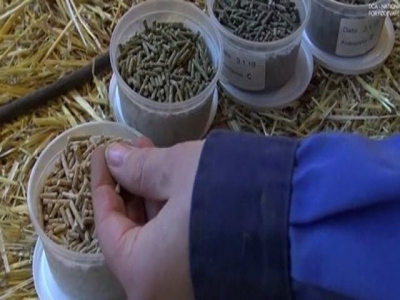Grass protein to be tested in organic pig feed

Aarhus researchers in Denmark to determine if clover grass protein may replace soybean meal in organic swine feed.
The pigs are fed a diet in which part of the protein comes from clover grass.
A group of researchers at Aarhus University in Denmark is examining whether it will be possible to replace traditional protein sources with protein from clover grass in organic pig feed. They are rather optimistic.
The organic animal science platform at Aarhus University recently received a herd of pigs that are part of a major project. The pigs will be fed a diet in which part of the protein comes from clover grass instead of traditional protein sources like soybean meal.
"We want to demonstrate that it is possible to replace part of the imported soya used in standard compound feeds with grass protein. We succeeded in completely removing soya from our 15% compound feed," said researcher Lene Stødkilde-Jørgensen with the Aarhus department of animal science.
For many years, researchers have contributed efforts to the cultivation and management of green biomasses, and it turns out that the cultivation of grass increases productivity in the fields as well as contributes to reducing nitrogen loss or leaching from the fields.
The actual process of extracting the protein from the grass requires a significant amount of time, the university said. It takes place at the biorefinery plant in Foulum, Denmark, and an even bigger plant for grass protein production currently is under construction. Besides protein, the green crops also contain a fiber fraction that may be used as cattle feed or as raw material in biogas or ethanol production, Aarhus said.
The experiment was initiated in November, when the pigs were weaned. Since then, they have been fed one of four compound feeds, each with varying contents of grass protein. They will be fed until slaughter in March.
"All four compound feeds have been composed to satisfy the pigs’ needs. However, even though we may, theoretically, have excellent feeds with all the right nutrients, we still have to examine if the pigs grow as well as we expect them to, and the first step is to see if they want to eat the feed. Grass protein has a very strong taste of grass," Stødkilde-Jørgensen said.
Two months into the study, the researchers said they are optimistic. "We notice that all four groups of pigs thrive very well; they eat well and seem in good health."
In addition, the researchers said they need to examine the importance of grass protein in relation to the taste, color and structure of the resulting pork meat as well as the contents of fatty acids and vitamins in the meat and lard. Previous studies in chickens demonstrated a connection between high contents of unsaturated fatty acids and vitamins in clover grass protein and the corresponding content in chicken meat.
Speaking in terms of nutrition, this will result in an improved fatty acid composition with increased omega-3 fatty acid content. On the other hand, it may also be important to the shelf life of the meat, the researchers said.
"We have to study this in more detail, as consumers expect products that are similar to those they usually buy. We will carry out a series of analyses and expect to provide some answers in 2019," Stødkilde-Jørgensen said.
The SuperGrassPork project is part of the Organic RDD 3 program, which is coordinated by the International Centre for Research in Organic Food Systems. It is funded by the Green Development & Demonstration Program under the Danish Ministry of Environment & Food.
Có thể bạn quan tâm
 Study Mannanase, multi-enzyme supplementation improves feed efficiency in pigs
Study Mannanase, multi-enzyme supplementation improves feed efficiency in pigs Ireland based researchers have found that xylanase or xylanase + β-glucanase dietary supplementation does not seem to improve feed efficiency in grow-finisher
 Drone may help reduce use of antibiotics in livestock
Drone may help reduce use of antibiotics in livestock Drones equipped with thermal imaging cameras have been buzzing over a research feedlot near Amarillo, as researchers develop test methods to identify feverish
 Facial recognition technology aims to detect emotional state of swine
Facial recognition technology aims to detect emotional state of swine Early identification of pig health issues gives farmers opportunity to improve animal well-being by tackling problems quickly.